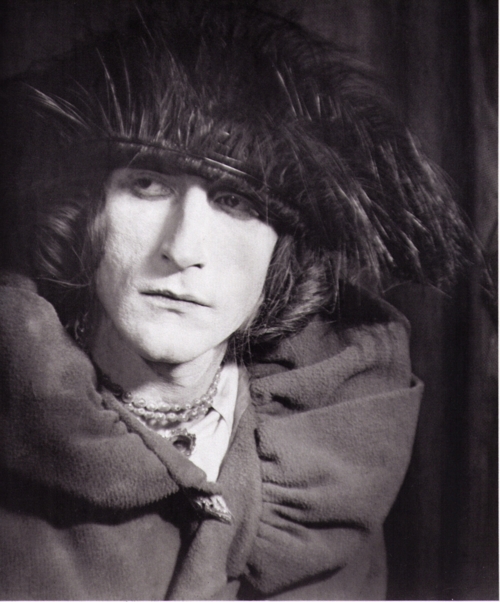In the wake of all these great posts on identity in virtual worlds (and RL – thanks, Kris!), Vaneeesa and I started talking about the ease which virtual environments such as SL allow for identity exploration. As many with an Art History background know, identity exploration has been a pivotal theme in twentieth century art, with artists like Marcel Duchamp and Andy Warhol dressing in drag for the sake of art. Vaneeesa brought up the interesting question (which I had never really thought about) of whether these artists formed a female alter ego as a campy joke or as the only feasible means of exploring a transgendered identity. While I think that in the case of Duchamp it was a little bit of both, it begs the question of how such artists would have used embodied virtual environments such as SL to explore alternate identities.

As an educator, I know that identity plays an integral part of learning. Not surprisingly, role play has been successfully used as a pedagogical tool in virtual world education and continues to be a strong educational affordance of the technology. With that said, educational role play exercises have focused mostly on traditional, professional roles (e.g. nurse, business owner, promoter, mediator, etc.) with little emphasis on identity exploration for its own sake. For example, the effect of extreme identity exploration (including transgendered identity) on virtual learning has yet to be explored. As more and more learners develop online identities (extending not only to SL, but also Facebook, Twitter, and other social networking sites), I think that such research is warranted. Kris’ work, for example, touches upon many of these gaps in the current educational literature – what can we learn through the exploration of an alternate identity? How do we learn from this alternate identity? What does creating this alternate identity say about us?
It seems to me that identity exploration as a pedagogical tool can only be beneficial. Considering the subjectivity of many disciplines and the importance of analytical thinking in higher education, it seems like exploring an alternate point of view would only extend the potential for learning. There comes a point in formal education where memorizing facts is no longer enough. Students need to be able to assess alternate point of views and either integrate them into their own thinking or reject them altogether. Regardless of the outcome, learners must be prepared to be confronted by these alternate point of views and perspectives. By actually appropriating these perspectives through identity exploration, students can see problems through new lenses and hopefully find solutions that they perhaps would not have been able to formulate otherwise. It’s one thing to appropriate the identity of a nurse for a school project and quite another, to use one of Vaneeesa’s performances as an example, to become a senior citizen in SL. Imagine the possibility for a geriatric nurse to “become” a senior citizen and experience first hand what it means and feels to be living as an older individual in contemporary society. What do you think?

Thanks so much, Ironyca! You’re experiment sounds fascinating!!!!!!!! PLEASE update me on how it goes! Maybe a post? Pretty please?!?!?
I agree with your premise about how virtual worlds allow for experimenting with identify for education.
I’ve taken on several identities in Second Life, some identities I can “Be”, some I just can’t seem to connect with. Often when I can’t connect my interest wasn’t strong enough.
I think if your interest is strong and you have a supportive community, you can learn a role like a senior citizen. Whether or not you can actually assume that identity or “be” is something different I think. Perhaps its all a question of degrees and how far you are willing to go.